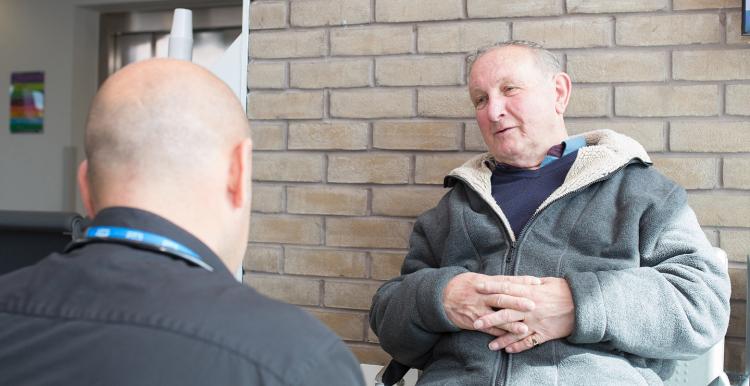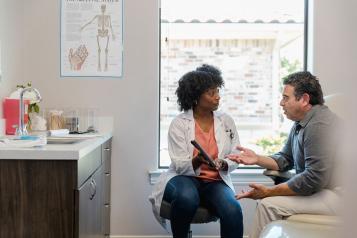Our response to the consultation on changes to North Central London Orthopaedic Services

The case for change
From the consultation documents presented, the clinical case for change seems clear. Currently waits are long, cancellations are common and demand for these services is growing as we are living longer.
We want to be sure that patients get the best possible care, and know that cancellations can cause a lot of additional anxiety. So if this plan can improve care and reduce cancellations - by offering operations from fewer, more specialised centres, whilst allowing for follow up care to still take place locally - then that must be a good thing. However, the impact of the changes will need to be measured, to demonstrate whether these aims are achieved.
Re-location and impact on journeys
Islington patients will most likely be seen for surgery at University College Hospital (UCLH), with follow up appointments held there or at Whittington Health depending on where the patient lives. Currently patients are able to have an operation at either hospital. Effective communication between both providers will be needed to ensure that being seen by two organisations does not negatively impact on a person’s care, nor the administration of that care.
- The changes will inevitably mean a longer journey to hospital for some, but a shorter journey for others. Any negative impact of this for our residents seems to be outweighed by the improvements set out in the clinical case: less cancellations, and shorter waiting times. Residents of other boroughs in North Central London may feel differently as their journeys could be more seriously impacted.
- Neither Warren Street station (near UCLH), or Archway station (near Whittington Hospital) have a lift, but both have escalators if a patient’s mobility is limited (for hip or knee operations for example).
- It is not clear whether orthopaedic patients would be eligible for patient transport, especially in light of changes to how criteria are implemented. We are under the impression that not many orthopaedic patients would qualify. For those who are eligible, UCLH and Whittington Health operate different systems for accessing transport and this would need to be clearly communicated to both patients and carers.
- For those not eligible for patient transport, we would welcome the providers promoting the Health Care Travel Costs Scheme to patients, though it only applies to a small percentage of patients and eligibility criteria should also be explained.
Information before your appointment
The consultation document focuses on methods of communication. A range of options should be offered to account for different people’s communication needs. Some of this will be covered by the Accessible Information Standard (meeting the communication needs of people with disabilities) but should also consider language needs and busy lifestyles (not everyone can call to book appointments during the day and e-mail may be easier).
- Information about where to go on the day of the appointment must reflect the signage used within the hospital or health centre. Our experience from visiting services is that this is not always the case and can cause confusion and make patients late for appointments.
- The communication should detail which entrance to use, which floor the appointment is on, and where the relevant reception is. Including maps and clear instructions would be helpful, along with postcodes for the area the patient needs to attend and contact details if the patient cannot find their way or needs to change their appointment.
- Some hospitals ‘hot desk’ their clinics, we assume orthopaedic surgery clinics will usually take place in the same location, but letters should detail specific arrangements if this is not the case.
- If directions on where to go for appointments cannot be made clear, it may be necessary to work with volunteers to direct people to the correct location.
- Ideally, appointments for operations and follow up care would be arranged at mutually convenient times for service and patient. Patients should be notified well in advance so that they can make the necessary arrangements. We sometimes find patients receive appointment letters very close (or sometimes after) their appointment.
- This communication should also include clear information on what to expect at the appointment, arrangements for getting home, how mobility might be impacted and support within the community.
- Where needed it would be good to offer information in other languages, but we would discourage the use of Google Translate for this as the quality is poor. We would recommend having key information available in a range of community languages, and writing to patients in clear, Plain English.
Information after your surgery
We would suggest that this offer is as flexible as possible and that people can decide at the time what communication approach might best suit their needs.
- We would encourage providers to focus on making patient discharge information as clear to patients and carers as possible. We know that Whittington Health have been working on this, including a specific page for patients/ carers written in non-clinical language so it can be easily understood. Other Trusts may be doing similar work.
- Instructions around medication should be written clearly, adhering to the Accessible Information Standard to meet communication needs, and include: the dosage; when to take the medication; any side effects (especially if they should not go home alone/ drive/ will have limited mobility)
- Often people are drowsy and may not take in information until they have returned home.
- As the advice to speed recovery after an operation is to eat healthily, exercise and stop smoking, it would be good to include up-to-date information on local support including peer support groups, links to useful web-pages, and details of who to contact if you’re concerned about your recovery.
- Patients who need a dressing, are advised to follow the instructions their nurse gives them to care for the wound at home. This could be offered in a range of formats (including YouTube/video).
- Where a dressing needs regular changing the hospital should liaise with primary care in a more integrated way, making appointments through the patients’ GP. Ideally appointments would be offered at the same place and time and with clear arrangements for weekends. We know of patients really struggling to make daily appointments for wound dressings impacting on their ability to work and causing great anxiety.
- Depending on what treatment the person has undergone they may be back at work, and juggling a range of commitments. Ideally follow up appointments would be at a time convenient to patients, with patients offered a choice. Patients should be notified well in advance so that they can plan around this.
Employing a care coordinator for patients with disabilities, autism, dementia or learning disabilities
This is a great idea as patients (and carers) with additional communication needs sometimes need additional support to access the same care as those without these needs.
- Waits can be more distressing for some patients, perhaps the coordinator can help identify patients for whom this could be an issue and suggest they are seen at the start or end of the day. The coordinator should be aware of Health Passports for patients with learning disabilities and/or autism.
- We would recommend that when appointed the coordinator(s) make contact with key groups for advice: Islington Autism Hub, Dementia Coordinator, Elfrida Society (and the Power and Control group for people with a Learning Disability), Centre 404 and Age UK for carers.
- We would also hope that this coordinator would be able to ensure that those that need interpreting are able to access it. Whether British Sign Language or a community language. And it would be useful if they were also able to support people in these categories to access PALS and complaints, should this be needed.
- The coordinator should liaise with patients and carers before the appointment to discuss any special provisions. People may have issues even with a needle and this will need careful management beforehand to minimise trauma.
Other suggestions
It would be good for follow up appointments to be offered at a range of times that give access to those who may have returned to work. A resident who had used the service on two separate occasions was working soon after their second operation and struggled to access follow up appointments because of how these were allocated. We know it’s not easy as resources are very limited, but patients should be offered choice and these appointments managed in a way that’s mutually convenient.
We think it is important to keep a close eye on cancellations. The case for change states that we should see an improvement in access and a reduction in cancellations. We would like to see the evidence of this once the new approach is up and running. It is stated that demand will increase, so it will be important to have oversight of how this demand, and the related waiting lists, are being managed.


